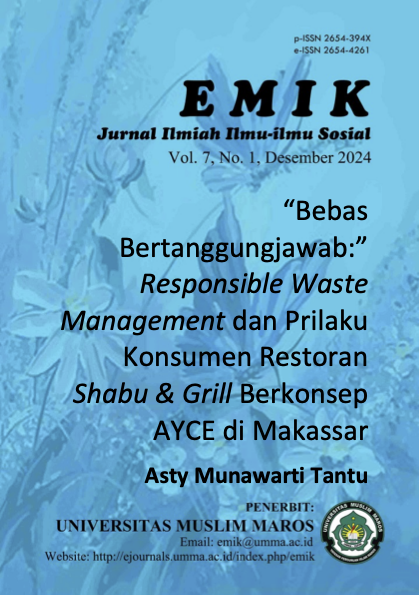“Bebas Bertanggungjawab:” Responsible Waste Management dan Prilaku Konsumen Restoran Shabu & Grill Berkonsep AYCE di Makassar
DOI:
https://doi.org/10.46918/emik.v8i1.2744Keywords:
restaurant, all you can eat, policy, challenge, responsible waste, environmentAbstract
In recent years, the All You Can Eat (AYCE) concept restaurant has become increasingly popular as a group dining venue among Indonesian consumers, including families, teenagers, office workers and culinary enthusiasts, food vloggers, etc. where people can eat as much as they want. However, consumers cannot just take the food. While most studies on food waste focus on how restaurants' policies prevent food waste, this article not only looks at restaurant policies, but also how consumers are responsible for what they take at AYEC concept restaurant.
This qualitative research was conducted on consumers of shabu & grill restaurants in Makassar, South Sulawesi, Indonesia. Informants was selested using puspossive sampling based on the criteria that they have experienced eating at AYCE restaurant. There are ten informants participated in this study, who are varied on the basis of gender (three males and seven females), age (between 21 and 30), and job (students, office workers, and general public). Data was collected using observation of dining activities and in-depth interviews, exploring their views on AYCE concept, restauran’st policy, and consumers’ responsibility (driven by individual awareness and fine system).
Shabu & grill all-you-can-eat (AYCE) restaurants offer a unique dining experience for counsumers, not only in their diverse food offerings but also through specific policies: fixed pricing, self-service, time limits, and a fine system. The fixed, upfront payment allows diners to enjoy unlimited dishes, differentiating it from conventional à la carte restaurants. The self-service model provides customers with full autonomy in selecting their desired food. However, time limits necessitate self-control to prevent food waste and exceeding allocated dining durations, both of which incur fines. Consumer perspectives on the AYCE concept are twofold: food exploration and food responsibility. The former allows patrons to sample a wide array of dishes, while the latter fosters individual accountability for consumption, driven by personal awareness and the fear of penalties for leftover food or exceeding time limits. Consumers employ situational adaptation strategies to adjust behavior to AYCE demands, as well as economic calculations through careful food and portion selection to manage consumption. Consequently, AYCE restaurants operate as a "controlled freedom" environment, where the liberty to eat unlimited food is balanced by consequences for irresponsible consumption.
References
Brian, R. (2020). “Kajian Literatur Pengaruh Kualitas Makanan Suasana dan Harga Terhadap Kepuasan Pelanggan dan Loyalitas Pada Restoran All You Can Eat,” Jurnal Hospitality dan Pariwisata, https://journal.ubm.ac.id/index.php/hospitality-pariwisata/article/download/2460/1899, diakses pada tanggal 22 November 2024
Cahyani, A.G.; Werdani, K.M.; Az-Zahra, J.F.; Anggraini, N.T.; dan Rusdiyana, E. 2025. “Food Waste Management in Food Stalls: Anticipation and Management,” IOP Conf. Series: Earth and Environmental Science 1460, 1-7, https://iopscience.iop.org/article/10.1088/1755-1315/1460/1/012025/pdf, diakses tanggal 12 April 2025.
Lohita, V. A. K., Suprapto, W., & Sahetapy, W. L. (2022). Generasi Z Dalam Memanjakan Diri di Restoran All You Can Eat. Disertasi, Petra Christian University, Surabaya.
Lubis, D. (2022). Analisis Perilaku Food Waste Dalam Konsumsi Rumah Tangga Muslim dan Strategi Pencegahannya, https://repository.uinjkt.ac.id/dspace/handle/123456789/65683, diakses tanggal 22 November 2024.
Maemunah, S., Agustin, D., & Carindra, R. R. (2024). “Strategi Pengelolaan Sampah Makanan untuk Meningkatkan Kesadaran Publik Tentang Food Waste,” Jurnal Agrifoodtech, 3(1), 1-8, https://scholar.google.com/citations?view_op=view_citation&hl=en&oe=ASCII&user=wvCImwsAAAAJ&pagesize=100&sortby=pubdate&citation_for_view=wvCImwsAAAAJ:M3ejUd6NZC8C diakses tanggal 22 November 2024.
Mahadika, P. & Lubis, Z. (2022). “Pengaruh Periklanan dan Kualitas Makanan Terhadap Kepuasan Konsumen Restoran All You Can Eat,” International Journal of Digital Enterpreneurship and Business (IDEB), 3(1):36-44, https://ejournal.jic.ac.id/ideb/, diakses tanggal 15 Maret 2025.
Putri, A. & Wijayanti, P. (2024). Restoran All You Can Eat: Food Waste dan Upaya Menguranginya, https://repository.ipb.ac.id/handle/123456789/141130, diakses tanggal 22 November 2024.
Sani, R., Yusuf, M., & Heikal, J. (2024). “Fenomena Restoran All You Can Eat Yang Penuh Reservasi Pada Saat Bulan Ramadan di Jakarta Menggunakan Grounded Theory,” Jurnal Media Akademik (JMA), 2(7): 1-13, https://jurnal.mediaakademik.com/index.php/jma/article/view/666 diakses tanggal 22 November 2024.
United Nations Environment Programme (UNEP). (2021). Food Waste Index Report 2021, https://www.unep.org/resources/report/unep-food-waste-index-report-2021, diakses tanggal 14 September 2024.
Mughni, A., & Latief, A. H. (2021). “Tinjauan Terkait Denda Pada Restoran Dengan Konsep All You Can Eat Dalam Perspektif Syariah: Studi Kasus Restoran Kintan Buffet Kota Kasablanka),” Jurnal Hukum Ekonomi Syariah, 4(1):1-26, https://jurnal.tazkia.ac.id/index.php/attahkim/article/view/53/48, diakses tanggal 24 Juni 2025.
Hidayah, M. H. F., Harahap, M. A. G., Liza, M., Harahap, R. F. T., & Salamah, A. H. (2025). “Praktik All You Can Eat Dalam Tinjauan Hukum Islam,” Jurnal Budi Pekerti Agama Islam, 3(1):260-273, https://doi.org/10.61132/jbpai.v3i1.899, diakses tanggal 24 Juni 2025.
Jayanti, S. D. (2022). “Analisis Kualitas Layanan Self-Service terhadap Kepuasan Pelanggan di Restoran All You Can Eat Kota Bandung, Indonesia,” International Journal Administration, Business & Organization, 3(3), 71-80, https://ijabo.a3i.or.id/index.php/ijabo/article/view/226, diakses tanggal 25 Juni 2025.
Hidayah, M. H. F., Harahap, M. A., Liza M., Harahap, R. F. T., Salamah, A. H. (2025) “Praktik All You Can Eat dalam Tinjauan Hukum Islam,” Jurnal Budi Pekerti Agama Islam, 3(1):260-273, https://journal.aripafi.or.id/index.php/jbpai/article/view/899/1317 diakses 30 Juni 2025.
Sugiyono (2019). Metodologi Penelitian Kuantitatif dan Kualitatif dan R & D. Bandung: Alfabeta,https://www.scirp.org/reference/referencespapers?referenceid=3655798#:~:text=Sugiyono%20(2019).,%2D%20References%20%2D%20Scientific%20Research%20Publishing, diakses tanggal 30 Maret 2025.

Downloads
Published
Issue
Section
License
Copyright (c) 2025 Asty Munawarti Tantu

This work is licensed under a Creative Commons Attribution-ShareAlike 4.0 International License.








9.png)















